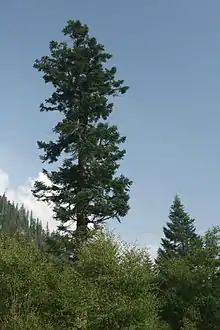Abies fargesii
Abies fargesii (Chinese: 巴山冷杉) is a species of fir, a coniferous tree in the family Pinaceae. Its common name is Farges' fir, after the French missionary, botanist and plant collector, Paul Guillaume Farges. Abies fargesii can grow very large and be up to 40 metres (130 ft) tall. It is endemic to central China where it is found in Gansu, Henan, Hubei, Shaanxi, and Sichuan provinces. It grows in mountains and river basins at altitudes between 1,500–3,900 metres (4,900–12,800 ft) ASL. The cones of the given fir are 0.8 to 1.5 by 1.3–2 centimetres (0.51–0.79 in).[3]
| Abies fargesii | |
|---|---|
 | |
| Scientific classification | |
| Kingdom: | Plantae |
| Clade: | Tracheophytes |
| Clade: | Gymnosperms |
| Division: | Pinophyta |
| Class: | Pinopsida |
| Order: | Pinales |
| Family: | Pinaceae |
| Genus: | Abies |
| Species: | A. fargesii |
| Binomial name | |
| Abies fargesii | |
| Synonyms[2] | |
| |
Abies fargesii is a timber tree used in construction and for pulp.[3]
The Latin specific epithet fargesii refers to the French missionary and amateur botanist Père Paul Guillaume Farges (1844–1912).[4][5]
Varieties:
- Abies fargesii var. sutchuenensis Franch. (synonym: Abies sutchuenensis (Franch.) Rehder & E.H.Wilson)[6]
Gallery
 Picea asperata (left) and A. fargesii (right), Jiuzhaigou Valley, Sichuan, China
Picea asperata (left) and A. fargesii (right), Jiuzhaigou Valley, Sichuan, China Buds and foliage of A. fargesii var. faxoniana
Buds and foliage of A. fargesii var. faxoniana
References
- Xiang, Q.; Rushforth, K. (2013). "Abies fargesii". IUCN Red List of Threatened Species. 2013: e.T42281A2969399. doi:10.2305/IUCN.UK.2013-1.RLTS.T42281A2969399.en. Retrieved 17 November 2021.
- The Plant List Abies fargesii Franch.
- Liguo Fu; Nan Li; Thomas S. Elias & Robert R. Mill. "Abies fargesii". Flora of China. Missouri Botanical GardenSt. Louis, MO & Harvard University Herbaria, Cambridge, MA. Retrieved June 25, 2012.
- Allen J. Coombes The A to Z of Plant Names: A Quick Reference Guide to 4000 Garden Plants, p. 99, at Google Books
- Janet Mohun (senior editor) Nature Guide Trees, p. 306, at Google Books
- "Abies fargesii var. sutchuenensis Franch. | Plants of the World Online | Kew Science". Plants of the World Online. Retrieved 4 February 2021.
